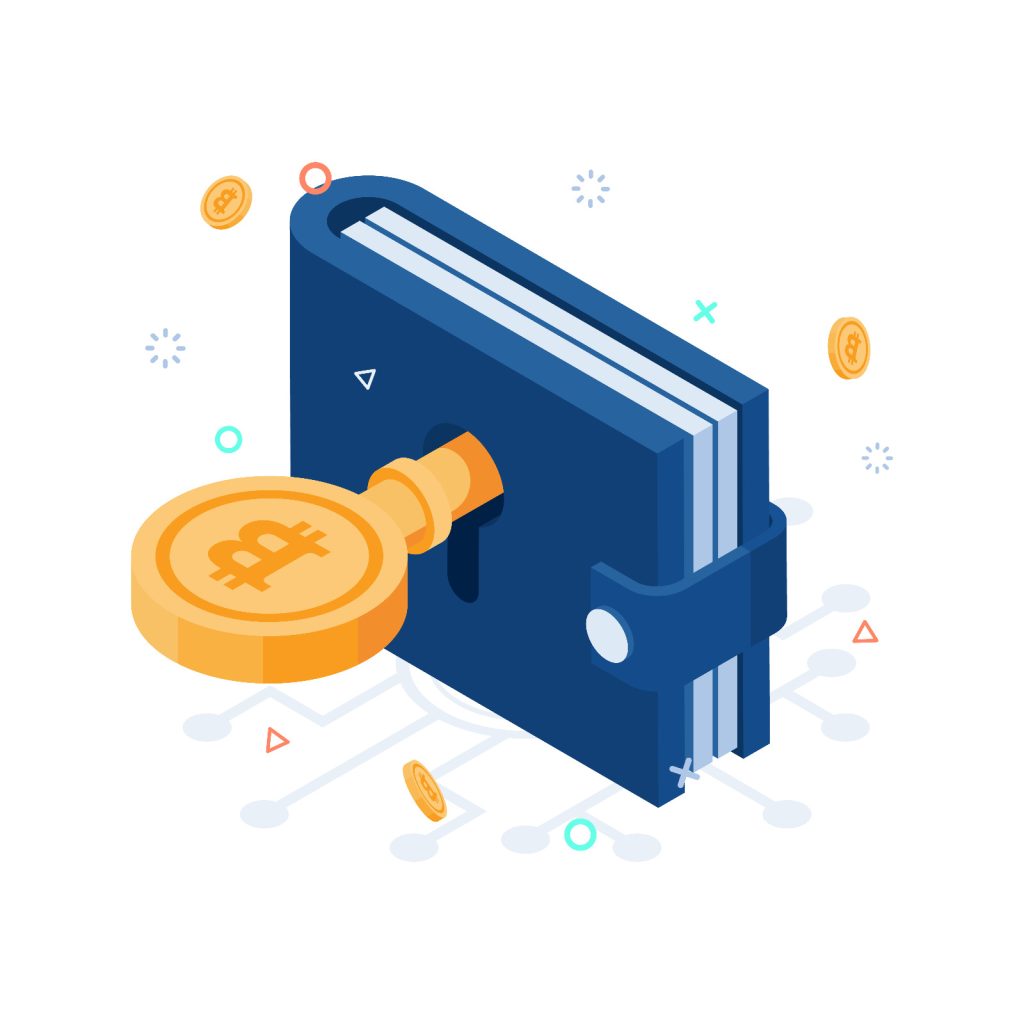In the ever-evolving world of cryptocurrencies, understanding the storage mechanisms for your digital assets is key. One such mechanism is the ‘hot wallet’ – a type of digital wallet always connected to the internet, allowing easy access to your crypto assets. But what exactly is a hot wallet?
Hot wallets are software applications that store your cryptocurrencies in an environment that is always connected to the internet. They derive their name from the constant ‘online’ status, which is perceived as ‘hot’, akin to a live wire in electrical parlance. This connectivity offers immense benefits like quick access to funds, facilitation of swift transactions, and suitability for trading – hence their popularity among cryptocurrency traders and businesses.
However, just like any innovation, they come with their peculiarities. They are much more than just digital purses for your digital coins. They function using advanced cryptographic techniques, play crucial roles in cryptocurrency transactions, and their use requires a careful understanding of their strengths and vulnerabilities. A clear comprehension of hot wallets, their benefits, and risks is therefore essential for anyone venturing into the world of cryptocurrencies.
The Working Mechanism of Hot Wallets
To appreciate hot wallets fully, one needs to understand how they work. At their core, hot wallets are all about facilitating secure digital transactions, and they achieve this using a system of public and private keys – a fundamental concept in the realm of blockchain and cryptocurrencies.
Think of your public key as an email address. It is a string of alphanumeric characters that you share with others to receive funds. This is the address that others use to send cryptocurrencies to your wallet. This key is transparent and traceable on the blockchain network, maintaining the ethos of open, decentralized transactions.
On the other hand, your private key is like a highly secretive password. This key is a cryptographic code known only to you and is used to sign off or authorize a transaction from your wallet to another wallet. This is what enables you to send cryptocurrencies to others. This key is strictly private; sharing it with others is akin to giving them access to your entire wallet.
The balance between these public and private keys is the foundational bedrock of how hot wallets operate. This dual-key cryptography ensures that while the system remains transparent and open, individual wallets can initiate transactions securely and privately. Hot wallets thus embody a beautiful synergy between the openness of blockchain transactions and the privacy of individual trades.
It’s worth noting that hot wallets don’t physically ‘store’ your cryptocurrencies like a traditional wallet stores cash. Instead, they store these cryptographic keys that connect you to your cryptocurrencies on the blockchain. In essence, they are your passport to access and transact with your digital assets on the blockchain ledger.
Exploring the Types of Hot Wallets
There’s a multitude of hot wallets available in the cryptocurrency landscape, each with its unique features, benefits, and security measures. Here, we list some of the popular options:
- MetaMask: A browser-based wallet that also acts as a gateway to blockchain apps. Known for its user-friendly interface and seamless Ethereum integration.
- Coinbase Wallet: A mobile wallet brought to you by the renowned Coinbase exchange. This wallet supports a variety of cryptocurrencies and also integrates with decentralized apps (dApps).
- Edge Wallet: A versatile mobile wallet known for supporting a broad range of cryptocurrencies. Edge also provides security features like client-side encryption and automatic backups.
- Mycelium: Primarily a mobile wallet with advanced privacy and security features. Mycelium is an open-source wallet and is popular among more tech-savvy users.
- Exodus: A desktop-first wallet, also available for mobile devices. Exodus offers a sleek user interface and supports a plethora of cryptocurrencies.
Remember, choosing the right hot wallet largely depends on your individual needs – the type of cryptocurrencies you want to store, the volume of transactions you intend to perform, and the level of security you desire. Always weigh the features of a hot wallet against your requirements before making a choice.
Hot Wallets Vs Cold Wallets
Before diving into the comparison, it is essential to understand the fundamental difference between hot and cold wallets. Hot wallets, as we’ve discussed earlier, are cryptocurrency wallets that are always connected to the internet. In contrast, cold wallets are storage devices that keep your cryptocurrencies offline.
To better comprehend these two types of wallets, let’s delve into a comparative analysis:
| Feature | Hot Wallets | Cold Wallets |
|---|---|---|
| Internet Connection | Always connected | Disconnected, offline storage |
| Ease of Access | Very convenient | Can be cumbersome to access |
| Ideal For | Trading and frequent transactions | Long-term storage |
| Cost | Usually free or cheaper | More expensive |
| Security | Vulnerable to online threats | More secure against online threats |
| Examples | MetaMask, Coinbase Wallet | Trezor, Ledger |
While hot wallets are known for their convenience and ease of use, they are more susceptible to online threats, including hacking and phishing attempts, due to their constant internet connection. They are perfect for traders and individuals who need quick access to their digital assets.
On the other hand, cold wallets offer a more secure way of storing cryptocurrencies, making them less prone to online threats. This security, however, comes with reduced accessibility, as your assets are not readily available for transactions. These are ideal for long-term investors who don’t need to access their digital assets regularly.
Despite their differences, both hot and cold wallets have their place in the world of digital currencies. Depending on your needs, you might use a hot wallet for your daily transactions and a cold wallet to store your long-term investments safely.
Security Concerns with Hot Wallets


While hot wallets facilitate immediate access and swift transactions, they also carry certain risks. The most significant concern is their vulnerability to online threats, being constantly connected to the internet.
- Hacking: Hot wallets are susceptible to various hacking techniques like phishing, malware, and ransomware attacks. Hackers can exploit security weaknesses to gain unauthorized access to your wallet and siphon off your digital assets.
- Exchange Breaches: Since many hot wallets are tied to cryptocurrency exchanges, they are also vulnerable to exchange-related security breaches. High-profile cases, like the Mt. Gox and Bitfinex hacks, resulted in massive losses for hot wallet users.
- Private Key Exposure: If a third party gains access to your private keys, they gain control over your wallet and its contents. In a hot wallet setup, these keys are stored online, making them potentially vulnerable to cyber attacks.
Proactive Safety Measures for Hot Wallets
Despite the inherent risks, there are numerous proactive measures you can take to secure your hot wallet:
- Strong Passwords: Always use strong, unique passwords for your wallet. Combine numbers, symbols, and both lower and upper case letters to create a robust password.
- Two-Factor Authentication (2FA): Enable 2FA for your wallet. This adds an extra layer of security, as it requires you to provide two types of identification before granting access.
- Regular Software Updates: Keep your wallet software and the device it resides on up-to-date. Updates often include patches for known security vulnerabilities.
- Wallet Backups: Regularly back up your wallet to ensure you can recover your digital assets in case of a device failure or if your wallet gets compromised.
- Be Wary of Phishing Attempts: Be cautious of emails, messages, or websites asking for your wallet information. Legitimate companies will never ask for your private keys or password.
- Use Secure Networks: Avoid accessing your wallet from public or unsecured Wi-Fi networks. These networks can be easy targets for hackers.
- Diversify Your Storage: Consider using a combination of hot and cold wallets to store your digital assets. Store a small amount for daily transactions in your hot wallet and the majority of your assets in a secure cold wallet.
Remember, while these measures can significantly enhance your hot wallet’s security, no system is entirely foolproof. Always stay vigilant and updated on the latest security practices.
The Role of Hot Wallets in Cryptocurrency Investing
Hot wallets play a significant role in cryptocurrency investing, providing ease of use and quick access that’s crucial for frequent trading. For those who actively engage in trading or require daily transactions, hot wallets are a preferred choice due to their connectivity and speed.
However, they may not be the best solution for long-term cryptocurrency investors, also known as ‘HODLers‘ in crypto parlance. Such investors buy and hold onto their cryptocurrencies for an extended period, betting on their value appreciation over time. In this case, cold wallets, with their superior security and offline storage, may be more appropriate.
Remember, striking a balance between security and convenience is key in the cryptocurrency investment world. One strategy could be to store a small portion of your investments in a hot wallet for quick transactions and the rest in a cold wallet for secure long-term storage. This combination could potentially offer both security and flexibility.
FAQs: Your Hot Wallet Concerns Answered
1. Can Hot Wallets Be Hacked? Yes, hot wallets can be hacked due to their constant internet connectivity, which makes them susceptible to online threats. This risk underscores the importance of following security best practices, such as using strong passwords, enabling two-factor authentication, and keeping software updated.
2. Are Hot Wallets Safe? While hot wallets are vulnerable to online threats, they can be kept safe by following robust security measures, including using strong passwords, enabling two-factor authentication, staying wary of phishing attempts, using secure networks, and regularly updating software.
3. How to Secure Your Hot Wallet? Securing your hot wallet involves various measures like using strong passwords, enabling two-factor authentication, regularly updating wallet software, being aware of phishing attempts, using secure networks, and making regular wallet backups. It’s also advisable to diversify your storage between hot and cold wallets.
Empowering Your Cryptocurrency Journey with Hot Wallets
Hot wallets play a vital role in the world of cryptocurrency. They offer a convenient and accessible way to transact digital currencies in real-time, making them essential for active traders and those needing daily transactions.
However, their internet-dependent nature brings inherent security risks. It’s crucial to understand these risks and adopt proactive measures to secure your digital assets. These measures include using strong passwords, enabling two-factor authentication, staying updated with the latest software, and being vigilant about possible phishing attempts.
Remember, while hot wallets offer unmatched convenience, it’s essential to balance that with the security provided by cold wallets. As part of your cryptocurrency management strategy, consider diversifying your storage, placing only the necessary amounts in your hot wallet while keeping the majority of your assets in a hardware wallet.
In this fast-paced digital era, hot wallets empower you to navigate the cryptocurrency landscape with ease. Equip yourself with the right knowledge and practices to make your journey safe and rewarding. Enjoy the convenience, but stay vigilant about your security. Happy crypto journey!









